2022 Macy Fellows

Camryn Amen
When I was in the fifth grade, my class was tasked with writing an essay that discussed something we had that meant a lot to us. While many of my classmates wrote about toys, trophies, video games, all of which were respectable options, I took the prompt in a different direction. I wrote about confidence. This topic was almost hilariously ironic since I was painfully shy, but the essay essentially explained that my confidence stemmed from the feeling that I belonged in a community. I liked that I was a part of something. Now, all of this was explained at a fifth-grade level but reading the essay as an adult, the ideas still very much resonate with me. Community is an essential part of my confidence and allows me to be authentic and genuine in my life. When I got to college, I was seeking to belong to a community that wanted to work on themselves and see more out in the world than what we can see with the naked eye. I learned about the Macy Leadership Fellowship Program very early on in my college career, but I knew that being a part of this opportunity was something big, and I wanted to be ready for it. Due to the tumultuous twists and turns that COVID brought to my college career, the sense of community became even more vital for me as a student. I decided that this was the time to work on myself, to work on my career, to work on my confidence, and so with that, I applied to the program.
The Macy program is like no other at Drexel or any other university. It is a privilege to collaborate with peers in different majors at a time when it is vital for health care professionals to lean on and learn from one another. Macy is not your typical college class: we connect with each other, ask questions, disagree with one another, and overall learn how to become more articulate and confident in ourselves and what we value. We move through each class, each term, each experience as a unit. A unit that challenges its members to think bigger, to be comfortable with discomfort, and to find ourselves and what is important in our lives. Faculty members allow us the space to grow ourselves, our minds, and our values through important and meaningful discussions. While each facet of the program is well thought out and valuable, the mentorship is absolutely priceless. My mentor, Kathryn Farrell, MSN, an assistant clinical professor and track director of Quality, Safety, and Risk Management, has been a phenomenal resource, guide and friend who has allowed me to explore and accomplish my personal goals.
Winter term focuses on teamwork and collaboration with conversations facilitated by a myriad of incredible guest speakers whose careers inform our discussion. Their knowledge and experience as part of interdisciplinary health care teams are invaluable to a young professional trying to navigate working in a group. How I thought about the health care field and my personal leadership style and the way I view the world has been challenged. Although I still have much to learn, I know that my leadership style and self-awareness have changed drastically. I hope to take what I have learned from this class and my peers and become an advocate for women and children as a labor and delivery nurse. I know this class has provided me with an arsenal of skills to help others and become the best nurse I can possibly be.
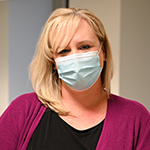
Susan Bradley
I learned about the Macy Leadership program through an email I received from Fred DiCostanzo, EdD, assistant clinical professor in Health Administration, and recognized this was a great opportunity to build confidence, work with a mentor and grow as a leader. The Macy program would also offer the opportunity to understand social determinants of health and increase knowledge of racial and social justice. Macy faculty and mentors are very passionate and continue challenging me to get out of my comfort zone—it’s their greatest strength. We have difficult conversations about complex issues and health-related problems. I have learned from Ebony White, PhD, assistant clinical professor in Counseling and Family Therapy, that my voice is important, it needs to be heard and my opinion matters. I am now a strong, confident woman who is bold and has the courage to speak my mind.
Taking leadership practices inventory and emotional intelligence assessments I was able to increase self-awareness and define and practice my own leadership style and what needs improvement. My mentorship with Michael Bruneau, PhD, assistant teaching professor in Health Sciences, is invaluable—he has taught me that my dreams can become a reality. He is dedicated to offering his expertise, and through our conversations, I see that my personal and professional growth as a leader is important to him. The program provided access to some of the top healthcare leaders in the area. Paula Agosto, RN, MHA, the chief nursing officer (CNO) at the Children’s Hospital of Philadelphia (CHOP), was a guest speaker in our class. I had an opportunity to do a project with the CEO, Jennifer French, of the Ronald McDonald House of South Jersey, and had a one-on-one conversation with Stephanie Conners, MBA, COO of Jefferson Health. These opportunities have given me a chance to learn and grow as a leader in the Healthcare field.
I will be able to reflect back on this experience and remember all the encounters I had with our faculty, staff, mentors, and peers. The Macy leadership program has helped me define my leadership style and will help me be the best healthcare leader I can be.

Kamryn Delaney
In my sophomore year my friend mentioned a fellowship program focused and based on leadership in which that she was participating in. She truly preached how she thinks every future health care worker should experience the Macy Undergraduate Leadership Fellow Program (MULFP), which motivated me to do my research and go through the application process. Once I had gone through the application and interview process, I was even more eager to participate in deepening my understanding of my leadership capacity and how I could continue to grow.
After my acceptance into the program, I was excited to start the class and nervous since it was one of the first classes I took with a smaller cohort and this specific structure. My self-confidence and doubt caused me to be nervous to start, as I knew this class would challenge my perspective and encourage deep self-reflection. It was different than any typical college course I have taken thus far. The class encourages open, enriching, and challenging conversations between the professor and cohort members. Following the first class, I had already felt like I had been challenged and truly come to realize how much more I had to learn. The other unique aspect of the MULFP is the mentor-mentee matching program; we went through an intricate and catered matching process and were able to pick for an accomplished group of individuals to be our mentors and help guide us through this course.
My mentor encourages my personal development while also helping guide me through the professional aspects. The mentors also offer emotional support as we navigate each course. This class has challenged my self-awareness, and having the support of mentors, faculty, and classmates has been invaluable.
The class has provided students from across multiple majors with a safe and open space to grow and learn. Our class starts with a check-in where we discuss our wellbeing and emotions, which has allowed us to develop a comfortable and safe space where we can be vulnerable and have the support system of our classmates. That has been one of the greatest strengths of this program so far. The safe space it provides allows for self-growth and education through learning and becoming the leaders we want to be. The learning experience is more integrative and rawer, which is even more effective since we aren’t just listening to a professor lecture. Still, the structure of the class allows for us to examine and integrate the practices we are taught. And in the end, we evaluate our strengths and weaknesses and then revaluate continuously as we grow through the program.
Thus far, my greatest takeaway has been that the process of becoming a well-rounded leader has no endpoint. Our own personal and professional development is a continual challenge. Leadership is a lifelong journey; we can’t get off the bus and just one day decide we are the best leader we can be. This class has taught me the circumstantial changes that influence our ability to act and adapt as a leader. That mindset will be carried through all the personal and professional challenges I face. My self-doubt has also started to dissipate through the program thanks to encouragement from my mentor, the faculty, and classmates. The program also provides the mindset that mistakes aren’t hurtful but helpful and bring me that much closer to being the leader I aspire to be. I truly believe every person should have the opportunity to take a course like this. In the end, I know this program will have a long-lasting impact on how I approach life and leadership.
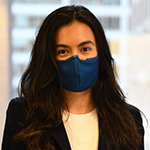
Jaqueline Enriquez
On an ordinary afternoon in search for an elective course, I came across a non-traditional leadership program that instantly captured my curiosity and it was called Macy Undergraduate Leadership Fellowship Program. Its uniquely profound social justice approach to leadership fascinated me the most, as I believe effective leadership is one that is committed to being a change agent, especially during these recent years of raw, explicit and exacerbated social and racial injustice. Roberta Waite, EdD, the program’s founder and former professor, associate dean for Community-Centered Health & Wellness and Academic Integration and executive director of Stephen & Sandra Sheller 11th St. Family Health Services, developed student-centered interdisciplinary learning with students from an array of health professions that also fosters the self-knowledge, attitudes, skills and values necessary to lead. Personally, Macy has awakened the power of my voice and belief in myself that I too, deserve a seat at the table and when I do, I speak of change. It also has considerably improved my emotional intelligence and communication skills, strengthened my confidence and opened professional networking opportunities. It has taught me indispensable skills for teamwork, team leading and community health. This experience has been one of the best in my college career; it has forever changed the way I value and view leadership. As a Latina, it was game-changing to have professors speak about deep-rooted causes of health inequities and share their personal stories. For the first time in a class setting, I felt acknowledged and heard as a minority and more importantly I felt understood.
Everyone that is associated with the Macy program shared their own wisdom and experiences that have created profound discussions, seminars and group activities. It creates a safe and secure environment that allows effective learning where one’s curiosity is continuously cultivated and rewarded. Furthermore, it unrestrictedly built my capacity to take action in promoting health equity and social and racial justice in my community and at large. This is the first time where I felt part of a truly warm and inviting classroom setting. My mentor has guided me through new, uncharted territory with grace and I could not have done it without her kindness, patience, comprehension, coaching and wisdom. She has helped expand my networking skills and connections and has introduced a life-long friendship. Long after the Macy program ends, this new social justice leadership mindset, and my portfolio and toolbox will remain as I evolve and grow as a leader. I will walk out into the world with the intention to lead with a purpose that aligns with health equity and racial and social justice for all and use my self-knowledge and pass it on as a future mentor to disadvantaged children. To those of you thinking about the Macy program: YES, YES, YES, YES.
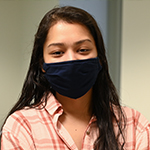
Meghan Gupta
When my academic advisor told me about the program, I did not understand what it was. So, at first, I was completely uninterested in the program. When I then found out from friends how remarkable the program is, and hearing their constant praises, I knew I underestimated it.
The program’s mission statement and mine partially aligned, so I felt it was right for me because I love public health, but I want to expand my knowledge in other health fields (nursing, leadership), seeing that it is all connected.
In the first term, I learned a lot about myself and the ways an effective leader behaves. I have utilized those skills in the student organization leadership positions I hold. I have made new connections and have seen an amplified desire to learn seep into my other classes.
The faculty are absolutely phenomenal. Their backgrounds, diversity and numerous experiences help us grow as leaders and human beings. We’ve had various speakers, who with vulnerability, spoke passionately about their work and provided insights. Another strength of this program is the one-to-one mentor/mentee. Connecting with a mentor has really helped me reflect more on myself as a person and my career path.
Macy is not a typical class—it is scholar-centered where faculty treat us as aspiring leaders and scholars. Receiving that respect makes me more confident to interact with the faculty more freely. With fellow scholars, my relationship has strengthened because we are seeing each other grow, working together on projects and connecting by sharing experiences.
I know my Macy fellowship will, unfortunately, come to an end, however, there are long-term benefits. First, I have learned how to be my authentic self around others. Being authentic has opened my life experiences to new relationships, new opportunities and new challenges. I have gained so much confidence over the past 15 weeks. Finally, as a student leader, I will continue to incorporate the effective leader aspects to become the best version of the leader I intend to be. This program is beyond amazing and anyone with dreams of leadership should take a leap of faith as I did and become the best version of yourself: confident, vulnerable, authentic and knowledgeable.
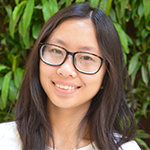
Amanda Ma
I learned about the Macy Undergraduate Fellows Leadership Program through two Macy alumni, Christina Gian and Naomi Kaufman; two brilliant and smart individuals. I was interested in the program for many reasons, particularly in developing a leadership philosophy. As an aspiring nurse, these skills are also essential to my career and will allow me to be a strong support for my patients and coworkers.
To improve my leadership skills, I knew I needed to do more than just self-reflect. There is much to learn through discussions with my class, guest speakers and my own mentor such as staying productive when you are burnt out or self-emotional regularity. Our world is diverse, as are the people we manage, so learning should be as well.
The best and most important part of the class is having guest speakers. Hearing their stories and phenomenal advice helped shape my goals and form my dreams of becoming a nurse manager. One of my biggest issues in learning leadership skills is my feelings of overwhelm; there is so much to discover, but I didn’t know where to start. The Macy program acts as a catalyst and facilitates learning by making me feel confident while stepping out of my comfort zone.
I was incredibly shy about speaking, I have bad social anxiety, and my networking skills needed work. The more I spoke in class and participated in discussions, the less scary it was to have the public spotlight! Macy indirectly helped relieve my anxiety. I never thought a class could become a safe zone until I participated in this program.
Ultimately, the program’s strongest benefit is the deep discussions we have and the rich connections we make with our peers, professors, mentors and guest speakers. The cohort is small, and as a result, our voices feel heard. I never felt left out in any discussions and that I was learning and working with all open-minded and reliable people. They are students who are all relatable yet so different. The team projects are interesting and thought-provoking—I personally loved when I met up with my Macy’s Leadership peers to film an interview-styled video for our project. The work in this class not only involves your intellect but your soul as well. There is no such thing as busy work in the program and each task contributes to my growth.
The Macy leadership program is an opportunity to truly look inward and enrich yourself with experiences and knowledge, more than a textbook could provide. I will never forget emotions, knowledge and relationships I developed through this program. Everyone means so much to me and it makes me so happy to see my peers’ growth.
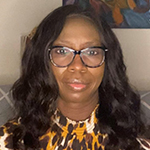
Jasy Mais
I am Jasy Mais, a transfer nursing student with the goal to be a pediatric nurse. I am from the land of many waters, Guyana. During the orientation week at Drexel University, I received an email from Roberta Waite, EdD, former professor, associate dean for Community-Centered Health & Wellness and Academic Integration and executive director of Stephen & Sandra Sheller 11th St. Family Health Services inviting me to apply to Macy Undergraduate Leadership Fellows Program (MULFP). The word “leadership” grabbed my attention enough to inquire about the program from my academic advisor.
I scheduled a meeting with Dr. Waite. She answered my questions, provided insight about the program goals and shared why she founded the program—“To give students opportunities to learn to address complex issues in an online setting that promotes inclusive excellence.” The Program entails three online leadership‐focused courses scheduled consecutively and the resources the MULFP offer for an undergraduate program is incomparable to other colleges and universities.
Mentors offer guidance to students as they enhance and develop their leadership skills. The wealth of skills I have developed are second to none. The support and counsel of my Macy faculty, Kimberly McClellan, EdD, assistant clinical professor in Undergraduate Nursing, and continual mentorship by Dr. Kimberly Plotts throughout the program has motivated me to be courageous. Their and my peers’ encouragement helped me learn to be my authentic self.
The activities and discussions are conducted to facilitate effective communication. Ebony White, PhD, assistant clinical professor, motivated students to explore diverse leadership experiences during the first quarter. Group dynamics where I learned that my opinions matter and to keep an open mind were encouraged through presentations and community projects. One of my best experiences was the Macy reception where I presented my elevator speech. It was an auspicious moment in my life.
MULFP is a diversity-integrated program with a curriculum that is culturally salient. Although courses are conducted via the Zoom platform the sessions are productive. The strategic initiatives of Alecia Fox, PhD, assistant clinical professor in Graduate Nursing, promote awareness of issues that are relevant to promoting effective leadership styles and guest speakers, like Ms. Paula Agosto. The most sentimental and valuable piece of information to enhance one’s leadership style she shared was “The Law of the Bench." Agosto (2022) confirmed “Great teams have great depth. The persons on the bench learn growth.” The wealth of wisdom she shared that enhanced her own leadership capacity included: lead by example. It was a humbling practice.
The Macy Program has continued to source and teach all students how to promote equity in a sphere of influence. That was demonstrated in an insightful and stimulating presentation by Stacia Wilkins, PsyD, on conflict management. I learned my conflict management style: compromising. I hope to use the Macy Program’s valuable resources to develop effective learning outcomes to achieve my goals. Therefore, I endeavor to have an open mind to achieve my goal to be a leader of a community center for homeless people.
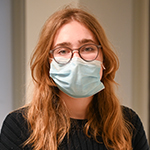
Clair Manger
I have had the honor to be in the Macy Program this year. I was looking to grow as a health care leader and become more educated in equitable health care. Though only halfway through the program, I feel more competent, a better leader.
When Roberta Waite, EdD, former professor, associate dean for Community-Centered Health & Wellness and Academic Integration and executive director of Stephen & Sandra Sheller 11th St. Family Health Services, gave a presentation about the program in one of my classes, I was instantly interested.
Part of the reason I joined the Macy Program was the uniqueness of the experience. I knew that this class would be unlike any other class I had taken in college. The make-up of the class itself was unique. Students ranged in age from 19 to 45—two of us returning to college later in life for their degrees. These diverse perspectives allowed for a broader view and unique learning experience. In addition, there are only ten class members, which lets each student have an individual relationship with the professor in contrast to my nursing classes, the class which lets each student have an individual relationship with the professor in contrast to my nursing classes which have 50 to 100 students per lecture. I am very grateful that I get to know my professors on a more personal level and learn more about the experiences that have shaped them. One of my biggest takeaways is the closeness with my classmates and how a college class can feel so supportive.
I have a deeper understanding of the impact of social justice on health care, how important holistic health care is, what it means to be your authentic self and how to pursue a leadership journey are just a few of the things we have touched on thus far. There are several things I hope to gain from this program. The first is independence, although I am already very independent, I believe I will learn how to succeed both collaboratively and independently in health care settings. Next, is how to incorporate my authentic self into the everyday. I have become more confident and have found my true self.
I feel the Macy Program is helping my college experience and will leave a lasting impact on me and my future. I am happy with the person this program is making me.

Antonio Mininno
Going into my senior year, I wanted to challenge myself academically and personally. Because the end of my sophomore year and all my junior year were virtual, it didn’t feel like school, but rather just completing assignments. I first learned about the Macy Undergraduate Leadership Fellows Program when my academic advisor forwarded me an email about the application deadline and information about the program. After looking through the program description, I was interested and felt like this could be the challenge I was seeking.
My professor at the time, Merritt Brockman, DHA, was a Macy graduate, so following our next class, I asked Dr. Brockman for her thoughts. She praised the program and encouraged me to apply to see for myself.
There are multiple strengths that separate this from a “regular” class, however, three specifically stood out; open communication within the class, a positive and encouraging support system and going past your comfort zone. Each classmate had to share their thoughts on conversations and topics —an exercise that not only helped open dialogue within the class, but also gave individuals a platform to share their knowledge. This directly correlated to a positive and encouraging support system where individuals were able to receive feedback from one another. When there were topics of which I had little to no knowledge my professors and classmates helped me learn. However, the topics I felt passionate about and may have caused disagreements with others, the open communication and support system, encouraged me to have these conversations that I would usually avoid. My opinion was welcomed leading to powerful discussions and me feeling like a leader and my true self.
The learning experience within this program is different than the typical college experience. We discovered how to address complex issues, gained a deeper understanding of root causes of health inequities and discussed strategies to promote collective efficacy within a positive and encouraging environment. Relationships with Macy faculty have grown allowing for exceptional connections within the college and with my classmates creating a positive culture where it feels as if we’ve known each other for years.
Applying for the Macy Undergraduate Leadership Fellows Program has been one of my best decisions at Drexel. For students deciding whether to join this program, let me tell you exactly what I was told; you will regret not taking it—it tests you mentally and academically. Being a leader, not only in health care but in life, is priceless.

Metchersa Smith
My anatomy professor said that Roberta Waite, EdD, former professor, associate dean for Community-Centered Health & Wellness and Academic Integration and executive director of Stephen & Sandra Sheller 11th St. Family Health Services was coming to explain the Macy Undergraduate Fellows Program and how it is beneficial to students. The fact that Dr. Waite, a Black woman, was spearheading this program was extremely important to me. In my one-on-one interview, she shared her vision for the program; I could see just how special the work that we do within the Macy Undergraduate Leadership Fellows Program is. I knew of the problems surrounding health care, but the pandemic exacerbated these issues. I wanted to be a part of a program that was dedicated to developing competent leaders.
I love that Macy is open to public health, nursing, and health profession majors. My coursework, as a nursing student, is primarily centered around the basics of nursing. The Macy Program exposed me to structural competency, cultural sensitivity and racial literacy which, in the end, will make me a better nurse.
Macy is unlike any of my other classes. Each class urges us to think more critically, disagree, agree and explore new topics. In our first term, we examined our leadership styles, set short and long-term goals and formed mentor-mentee relationships. I thoroughly enjoyed my first term and will forever treasure Ebony White, PhD, assistant clinical professor in Counseling and Family Therapy, as a professor. In our second term, our focus is primarily on our group projects—ours is Health Disparities vs. Health Inequities. My groupmates and I have a wonderful dynamic and have established great communication. I am excited to see what next term’s class will offer.
My favorite part of the program so far is the mentorship. My mentor, Essence Williams, MSN, is a midwife is extremely dedicated to mentorship and has provided me with sage wisdom and networking and other opportunities to excel and think beyond clinical nursing. Essence offered me the chance to present Methods of Postpartum Care with her at the Camden Healthy Start—a program affiliated with Southern NJ Perinatal Cooperative.
I have learned how to present myself, how to push myself and how to be the best leader I can be. The activities and content of this program are so intriguing and important, and the faculty make the program even better. The Macy Faculty has always been kind, understanding and dedicated to furthering our leadership abilities. I look forward to continuing this fellowship and seeing all the new things I will learn.
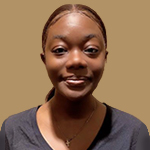
Patience Yarkpawolo
My name is Patience Yarkpawolo and I am a transfer co-op nursing student at Drexel University. My advisor recommended the Macy Undergraduate Leadership Fellows Program, and what attracted me was the many mentors from whom I could learn. Hearing stories from other nurses about their trials and tribulation while on the path to becoming a nurse helped me so much, especially when I am feeling stressed out or overwhelmed, I think about others’ journeys.
One strength of Macy is how we are challenged to become great leaders. Our professors encourage us to think deeper and get out of our comfort zone. I have discovered how to be more confident, that my opinions matter and about my leadership style and how to improve it. In the second term, we discussed group dynamics and how group+ leaders must be able to listen to everyone’s opinion and be respectful.
In our first term, our professor made sure the atmosphere was warm and safe. We expressed ourselves and how we were feeling at the check-in at the beginning of every class. It gave me the courage to open up and share my opinion about the discussions we have in class. We also get to speak to professional healthcare workers every week from different backgrounds. Unlike regular college courses, we don’t have the opportunity to express ourselves or how we feel about a situation.
The long-term benefits from this program will allow me to carry on what I’ve learned about my leadership style and leading others in the right direction. I want to carry on being able to listen to others and learn from my mistakes.
Overall, my experience with the Macy fellowship program has been a great experience, I love everything that it stands for. I like the professors and my fellow classmate; everyone is so nice, accepting and supported—everyone wants us to succeed. I now know how to talk about my challenges and ask for feedback. I look forward to continuing to learn about my leadership style and hope one day I can be a great leader like all the wonderful guest speakers that came to talk to us.